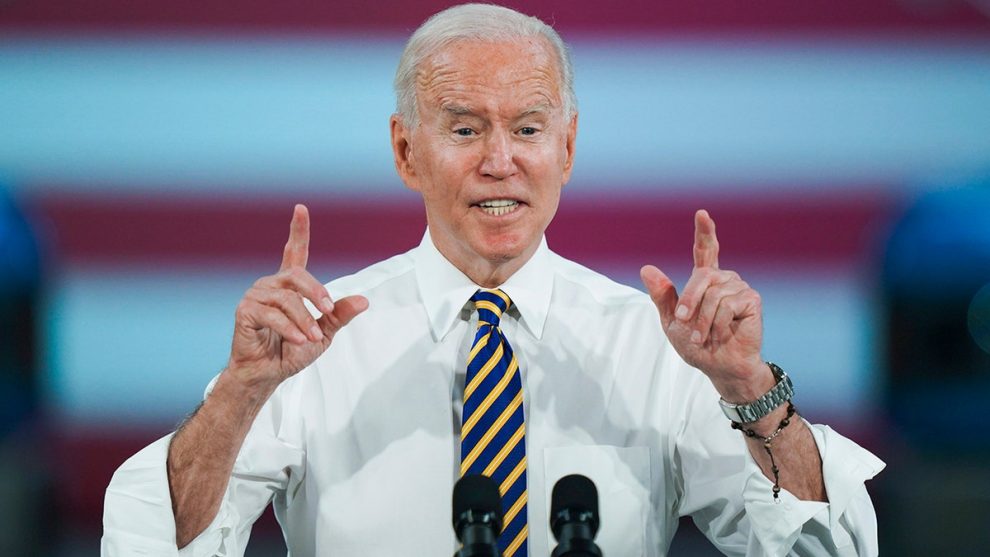President Biden announced this week that he is committed to working with lawmakers who have backed tearing down four hydropower dams in Washington to protect salmon species.
Biden remarked during a conservation event Tuesday that he would work with tribes, Sens. Patty Murray, D-Wash., Maria Cantwell, D-Wash., and Rep. Mike Simpson, R-Idaho, to “bring healthy and abundant salmon runs back” to the Columbia River system. The president didn’t say he would work with lawmakers or industry groups that have adamantly opposed breaching the dams.
Over the last several years — amid declining salmon populations in the lower Snake River which winds through Idaho and southwestern Washington before feeding into the Columbia River which, in turn, feeds into the Pacific Ocean — Murray and Cantwell have opened the door to proposals breaching four federally-managed dams in the river system. And Simpson has gone further, crafting a $33.5 billion framework endorsed by tribes to breach the dams.
“There are several major problems with glibly saying ‘we’re going to destroy the dams,'” said Todd Myers, the environmental director for the free market think tank Washington Policy Center. “The first is that it is contrary to the science. The Army Corps of Engineers, NOAA Fisheries and others did the most comprehensive scientific assessment of the dams ever a few years ago. And it concluded very clearly that we should keep the dams and that salmon can recover with the dams.”
ENERGY GROUP ASKS REPUBLICANS TO INVESTIGATE BIDEN’S INTERIOR SECRETARY OVER ETHICS VIOLATIONS
“The Biden administration is going against the most comprehensive scientific assessment done by the federal government itself,” Myers continued.
Myers — who is also a member of the Puget Sound Salmon Recovery Council, a state agency created to study and inform government efforts to restore dwindling salmon — added that breaching the four lower Snake River dams would be a “remarkable waste” of tens of billions of dollars considering the relatively minor impact such a project would have on the species.
In addition, multiple government and private reports have determined that breaching the dams would have a dramatic impact on energy production, climate goals and transportation in Washington.
BIDEN ADMIN SIDES AGAINST NATIVE AMERICANS IN CRACKDOWN ON OIL LEASING NEAR INDIGENOUS SITE
The dams were constructed in the 1960s and 1970s by the U.S. Army Corps of Engineers primarily to ensure the Snake River was impassable for barge transportation. However, since then, the main benefit has been their reliable clean energy output. They still provide about 8% of the state’s electricity, enough to serve millions of residents, and have a large capacity of 3,000 megawatts.
“Hydropower is a climate solution, and it will play a key role in helping the President achieve the goal of a zero-carbon electricity grid,” LeRoy Coleman, a spokesperson for the National Hydropower Association, told Fox News Digital. “Climate change poses the greatest threat of extinction to salmon, while hydro is carbon-free resource to fighting climate change.”
“Breaching dams on the Lower Snake River would be a step backwards in the effort to retire and replace existing carbon emitting plants,” Coleman added. “Removing 3,000 MW of dispatchable hydropower capacity during the middle of a climate crisis isn’t the solution.”
Removing the dams would chip away at U.S. climate goals since their energy production would likely need to be replaced by fossil fuel alternatives.
According to federal data, replacing the hydropower with efficient natural gas generation would increase carbon emissions by up to 2.6 million metric tons per year, the equivalent of 421,000 passenger cars.
“I think you’re getting a sense of how this is really more about ideology and a romance of open, unarmed rivers than it is about environmental benefits,” Myers told Fox News Digital.
BIDEN ADMIN MOVES TO SHUT DOWN ANOTHER MINE OVER ECO CONCERNS AMID GREEN ENERGY PUSH
Overall, hydropower accounted for 67% of Washington’s electricity generation in 2022, making the state by far the largest producer of hydropower. Electricity from the state’s hydropower alone represents 10% of the nation’s total renewable energy-generated electricity.
“The environmental impact of such a drastic increase cannot be overstated – and I sincerely and fundamentally struggle to understand how our friends in the environmental community can hear this data and not be truly alarmed,” Rep. Dan Newhouse, R-Wash., who has opposed breaching the dams, one of which is located in his district, said in 2021.
On Tuesday, both Newhouse and Rep. Cathy McMorris Rodgers, R-Wash., whose district is home to the other three dams, blasted Biden for of siding with those opposed to the dams.
“President Biden is perpetuating a dangerous, false narrative with the help of Senators Murray and Cantwell and Representative Simpson and they should be ashamed of themselves,” Newhouse said.
“He may as well have just said he supports dam breaching,” McMorris Rodgers added. “The president’s comments underscore his complete lack of understanding of the Columbia River System and the catastrophic implications dam removal would have on communities across Eastern Washington.”
On Thursday, the two lawmakers introduced legislation, the Northwest Energy Security Act, to protect the four dams which could only be breached through an act of Congress. Sens. Steve Daines, R-Mont., and James Risch, R-Idaho, introduced companion legislation in the Senate.
In addition to the impacts on energy and climate ambitions, industry groups said removing the four dams would disrupt the economy and harm agriculture exports.
“To suggest breaching the dams is to suggest jeopardizing that stability and the security we have in our economy,” Washington Farm Bureau President Rosella Mosby told Fox News Digital. “Moving agricultural products via barge utilizes the most carbon friendly means of transportation while also supporting critical infrastructure.”
“Washington Farm Bureau would encourage the President to give these impacts thoughtful consideration before making decisions with real life consequences for farmers, ranchers, and the environment,” Mosby added.
GREEN ENERGY PROJECTS FACE STARK ENVIRONMENTAL, LOCAL OPPOSITION NATIONWIDE
She noted that her group support policies ensuring an effective means of transporting agricultural goods, electrifying homes and conserving salmon runs. Dams, Mosby said, are the answer to ensuring the stability and success of all three.
Aided by the dams, barges traveling through the Columbia River system transport about 60% of Washington annual wheat exports. A staggering 40% of the nation’s total wheat production, valued at billions of dollars, travels through the river system.
“Over 60% of Washington wheat exports utilize the Columbia-Snake River System, which is essential for supporting a thriving overseas export market along with providing nearly 4,000 jobs,” said Michelle Hennings, the executive director of the Washington Association of Wheat Growers. “As a result, the breaching of critical dam infrastructure would threaten the viability of the Washington wheat industry and would cause greater adverse impact on the economy and the food supply chain as a whole.”
“We have the utmost concern for the health of the ecosystem and believe that dams and a thriving salmon population can and do co-exist,” she continued. “We stand ready to continue to work with the Administration and members of Congress to ensure that decisions are made through sound science and extensive research.”
And, according to Washington Grain Commission CEO Casey Chumrau, the river system feeds the largest U.S. wheat export gateway.
“Our nation’s inland waterways system is vital to moving American goods from farms to ports for export,” Chumrau told Fox News Digital.
“As the nation’s single largest wheat export gateway — supporting 40,000 jobs — more than half of all wheat exported from the U.S. moves through the lower Columbia-Snake River ports in Washington and Oregon, making it a crucial part of the U.S. economy and an irreplicable part of the global supply chain.”
The White House didn’t respond to a request for comment.
























